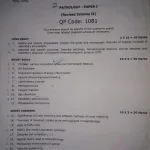Third-year GNM nursing students can benefit from well-organized question papers that provide an overview of important exam topics. Here are essential questions and answers from key subjects to support your preparation.
Medical-Surgical Nursing Questions
Question: What is the primary goal of nursing management in heart failure?
Answer: To improve cardiac output and manage symptoms.
Question: Define myocardial infarction.
Answer: Myocardial infarction is the death of heart muscle tissue due to lack of blood supply.
Question: What are common symptoms of chronic obstructive pulmonary disease (COPD)?
Answer: Symptoms include chronic cough, shortness of breath, and sputum production.
Question: What are the nursing interventions for a patient with pneumonia?
Answer: Ensure adequate oxygenation, encourage fluid intake, and administer prescribed medications.
Question: Explain the role of insulin in diabetes management.
Answer: Insulin helps regulate blood glucose levels by facilitating cellular glucose uptake.
Question: What are the postoperative nursing priorities for a patient undergoing appendectomy?
Answer: Monitor vital signs, manage pain, and prevent infection.
Question: Describe the nursing care for a patient with renal failure.
Answer: Monitor fluid balance, administer prescribed medications, and ensure dietary compliance.
Question: What is the significance of monitoring intake and output in patients with kidney disorders?
Answer: It helps assess fluid balance and detect potential complications.
Question: How can nurses prevent pressure ulcers in bedridden patients?
Answer: Reposition patients regularly, use pressure-relieving devices, and maintain skin hygiene.
Question: What are the signs of hypovolemic shock?
Answer: Signs include low blood pressure, rapid pulse, and reduced urine output.
Question: Define the term “asepsis.”
Answer: Asepsis is the absence of pathogenic microorganisms to prevent infection.
Question: What are the types of anesthesia commonly used in surgeries?
Answer: General, regional, and local anesthesia.
Question: List the key symptoms of tuberculosis.
Answer: Persistent cough, weight loss, fever, and night sweats.
Question: What are the nursing responsibilities during blood transfusion?
Answer: Monitor for reactions, ensure compatibility, and record vital signs.
Question: Explain the role of antibiotics in infection control.
Answer: Antibiotics eliminate or inhibit the growth of bacteria causing infection.
Question: What is the purpose of chest physiotherapy in respiratory disorders?
Answer: To clear airway secretions and improve lung function.
Question: What are the common complications of diabetes mellitus?
Answer: Retinopathy, nephropathy, neuropathy, and cardiovascular disease.
Question: Describe the management of a patient with deep vein thrombosis (DVT).
Answer: Administer anticoagulants, encourage leg exercises, and avoid prolonged immobility.
Question: What is the nursing management of burns?
Answer: Ensure airway patency, fluid replacement, and wound care.
Community Health Nursing Questions
Question: What is the primary goal of community health nursing?
Answer: To improve the health and well-being of individuals and communities.
Question: Define epidemiology.
Answer: Epidemiology is the study of the distribution and determinants of health conditions in populations.
Question: What are the components of primary health care?
Answer: Education, nutrition, immunization, sanitation, and disease prevention.
Question: Describe the role of a health worker in a rural area.
Answer: Provide basic healthcare services, promote health education, and support immunization programs.
Question: What is the expanded program on immunization (EPI)?
Answer: A program to provide universal vaccination against preventable diseases.
Question: How can nurses promote maternal health in the community?
Answer: Conduct antenatal check-ups, provide health education, and encourage institutional deliveries.
Question: What are the indicators of health in a community?
Answer: Infant mortality rate, life expectancy, and morbidity rates.
Question: What is the significance of family planning in public health?
Answer: It helps control population growth and improves maternal and child health.
Question: Describe the types of health education methods.
Answer: Methods include individual teaching, group discussions, and mass media campaigns.
Question: What is the role of a nurse in the prevention of communicable diseases?
Answer: Promote hygiene, support vaccination, and conduct disease surveillance.
Question: Define health promotion.
Answer: Health promotion involves activities aimed at improving overall well-being and preventing illness.
Question: What are the common waterborne diseases?
Answer: Cholera, typhoid, and hepatitis A.
Question: Explain the concept of social determinants of health.
Answer: These are conditions in which people are born, grow, live, and work, affecting health outcomes.
Question: What is the function of ASHA workers in India?
Answer: Provide community-based healthcare services and promote health awareness.
Question: What are the objectives of the National Health Mission (NHM)?
Answer: Improve access to healthcare, reduce infant and maternal mortality, and control diseases.
Question: Describe the steps in organizing a health camp.
Answer: Assess community needs, plan resources, mobilize staff, and conduct follow-up.
Question: What is the role of nutrition in community health?
Answer: Proper nutrition prevents malnutrition and supports overall health.
Question: How does sanitation impact public health?
Answer: Proper sanitation prevents the spread of infectious diseases and promotes hygiene.
Question: What is the significance of health surveys in community health nursing?
Answer: They provide data to identify health issues and plan interventions.
Mental Health Nursing Questions
Question: What is mental health?
Answer: Mental health is a state of emotional, psychological, and social well-being.
Question: Define schizophrenia.
Answer: Schizophrenia is a chronic mental disorder characterized by delusions, hallucinations, and impaired thinking.
Question: What are the symptoms of depression?
Answer: Persistent sadness, loss of interest, fatigue, and changes in appetite.
Question: How can nurses support patients with anxiety disorders?
Answer: Provide reassurance, teach relaxation techniques, and encourage therapy.
Question: What is the therapeutic use of electroconvulsive therapy (ECT)?
Answer: ECT is used to treat severe depression and other mental health conditions.
Question: Describe the nursing care for a patient with bipolar disorder.
Answer: Monitor mood swings, ensure medication compliance, and provide emotional support.
Question: What is the role of communication in mental health nursing?
Answer: Effective communication builds trust and facilitates better patient outcomes.
Question: Define psychosis.
Answer: Psychosis is a mental state characterized by a loss of contact with reality.
Question: What are the side effects of antipsychotic medications?
Answer: Side effects include drowsiness, weight gain, and extrapyramidal symptoms.
Question: Explain the importance of family support in mental health recovery.
Answer: Family support provides emotional stability and encourages adherence to treatment.
Question: What is the purpose of cognitive-behavioral therapy (CBT)?
Answer: CBT helps patients identify and change negative thought patterns.
Question: How can nurses promote mental health in the community?
Answer: Conduct awareness programs, provide counseling, and reduce stigma.
Question: What are the signs of substance abuse?
Answer: Behavioral changes, neglect of responsibilities, and withdrawal symptoms.
Question: Define post-traumatic stress disorder (PTSD).
Answer: PTSD is a mental health condition triggered by traumatic events.
Question: What is the role of occupational therapy in mental health?
Answer: Occupational therapy helps patients regain functional abilities and improve quality of life.
Question: What are the strategies for stress management?
Answer: Strategies include exercise, meditation, time management, and seeking support.
Question: How does a therapeutic environment benefit mental health patients?
Answer: It provides a safe space for healing and promotes recovery.
Question: Describe the nurse’s role in suicide prevention.
Answer: Assess risk, provide immediate support, and ensure safety.
Question: What are the causes of eating disorders?
Answer: Causes include genetic factors, societal pressure, and psychological issues.
Child Health Nursing Questions
Question: What is the Apgar score?
Answer: The Apgar score assesses the health of newborns based on five criteria.
Question: Define neonatal jaundice.
Answer: Neonatal jaundice is the yellow discoloration of a newborn’s skin due to high bilirubin levels.
Question: What are the signs of dehydration in children?
Answer: Signs include dry mouth, sunken eyes, and reduced urine output.
Question: Describe the nursing care for a child with diarrhea.
Answer: Ensure hydration, administer ORS, and monitor stool output.
Question: What is the purpose of growth charts in pediatric care?
Answer: Growth charts track a child’s physical development over time.
Question: How can nurses manage fever in children?
Answer: Administer antipyretics, provide tepid sponging, and encourage fluid intake.
Question: What is the importance of immunization in children?
Answer: Immunization protects children from preventable diseases.
Question: Describe the nursing interventions for a child with asthma.
Answer: Administer prescribed medication, teach breathing exercises, and monitor for triggers.
Question: What are the signs of malnutrition in children?
Answer: Signs include stunted growth, underweight, and low energy levels.
Question: Define congenital anomalies.
Answer: Congenital anomalies are structural or functional defects present at birth.
Question: How can nurses identify developmental delays in children?
Answer: Monitor milestones and observe for delayed speech, movement, or social interaction.
Question: What are the common causes of anemia in children?
Answer: Causes include iron deficiency, poor nutrition, and chronic infections.
Question: Explain the role of breastfeeding in infant nutrition.
Answer: Breastfeeding provides essential nutrients and strengthens immunity.
Question: What are the nursing priorities for a child with febrile seizures?
Answer: Ensure safety, reduce fever, and monitor neurological status.
Question: What is the significance of play therapy in pediatric care?
Answer: Play therapy helps children express emotions and cope with illnesses.
Question: What are the symptoms of measles in children?
Answer: Symptoms include fever, rash, and cough.
Question: Describe the management of a child with cleft lip.
Answer: Provide feeding support, monitor for infection, and prepare for surgery.
Question: How can nurses support parents of children with chronic illnesses?
Answer: Provide education, emotional support, and connect them with resources.
Question: What are the signs of respiratory distress in children?
Answer: Rapid breathing, nasal flaring, and chest retractions.
Preparation with comprehensive questions and answers ensures GNM nursing students are ready for third-year exams. Revising key topics across all subjects builds confidence and enhances performance.
Latest Posts
- Step-by-step guide to download and apply for jee mains admit card 202
- Comprehensive 2025 government holidays and recruitment details for job seekers
- JEE Mains Admit Card 2025: Your Step-by-Step Guide to Downloading the Hall Ticket
- Everything You Need to Know About 2025 Government Holidays Recruitment
- Comprehensive Guide to rrb d group recruitment 2025 – Eligibility, Vacancies, and Application
- Detailed guide to nps trust recruitment 2025 vacancies, eligibility and apply process
- Comprehensive guide to hpcl recruitment 2025 notification, vacancies, and application process
- ignou bed admission 2025 complete recruitment guide with eligibility and process
- Comprehensive Guide to Indian Army Agniveer Recruitment 2025 Notification and Jobs
- Everything You Must Know About CBSE Board Exams 2025 Changes & New Rules






